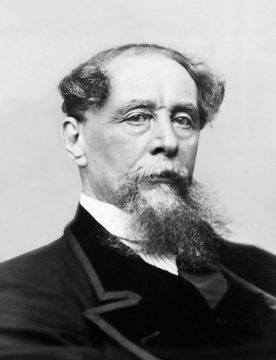Laurence Scott in The New Yorker:
 In February of 1824, Charles Dickens watched in anguish as his father was arrested for debt and sent to the Marshalsea prison, just south of the Thames, in London. “I really believed at the time,” Dickens told his friend and biographer, John Forster, “that they had broken my heart.” Soon, Dickens’s mother and his younger siblings joined the father at Marshalsea, while a resentful Dickens earned money at a blacking factory, labelling pots of polish for shoes and boots. Although his father would be released within months, Dickens would never fully outrun the memory of his family’s incarceration. In her 2011 biography, Claire Tomalin notes that, in adulthood, Dickens became “an obsessive visitor of prisons.” In the autobiographical essay, “Night Walks,” he describes halting in the shadows of Newgate Prison, “touching its rough stone” and lingering “by that wicked little Debtors’ Door – shutting tighter than any other door one ever saw.” While touring America as a famous author, he made sure to go and see the prisons in Boston, New York, and Baltimore, among others.
In February of 1824, Charles Dickens watched in anguish as his father was arrested for debt and sent to the Marshalsea prison, just south of the Thames, in London. “I really believed at the time,” Dickens told his friend and biographer, John Forster, “that they had broken my heart.” Soon, Dickens’s mother and his younger siblings joined the father at Marshalsea, while a resentful Dickens earned money at a blacking factory, labelling pots of polish for shoes and boots. Although his father would be released within months, Dickens would never fully outrun the memory of his family’s incarceration. In her 2011 biography, Claire Tomalin notes that, in adulthood, Dickens became “an obsessive visitor of prisons.” In the autobiographical essay, “Night Walks,” he describes halting in the shadows of Newgate Prison, “touching its rough stone” and lingering “by that wicked little Debtors’ Door – shutting tighter than any other door one ever saw.” While touring America as a famous author, he made sure to go and see the prisons in Boston, New York, and Baltimore, among others.
Dickens’s obsession appeared in his first novel, “The Pickwick Papers,” and would continue to haunt his imagination through the years. In “Great Expectations,” the provincial hero Pip visits Newgate and thinks “how strange it was that I should be encompassed by all this taint of prison and crime . . . starting out like a stain that was faded but not gone; that, it should in this new way pervade my fortune and advancement.” Newgate isn’t just the setting of Pip’s queasy tour. It waits to enclose Fagin at the end of “Oliver Twist,” and, in “Barnaby Rudge,” the historical novel about the Gordon Riots of 1780, a mob breaks into the prison and burns it down. “A Tale of Two Cities” begins with the return of a Bastille prisoner to his family, and ends in La Force, where the French revolutionaries hold those condemned to die by guillotine. And “Little Dorrit,” which was serialized between 1855 and 1857, is set in the Marshalsea, an imagined return to the place where Dickens’s father was kept from him.
More here.
